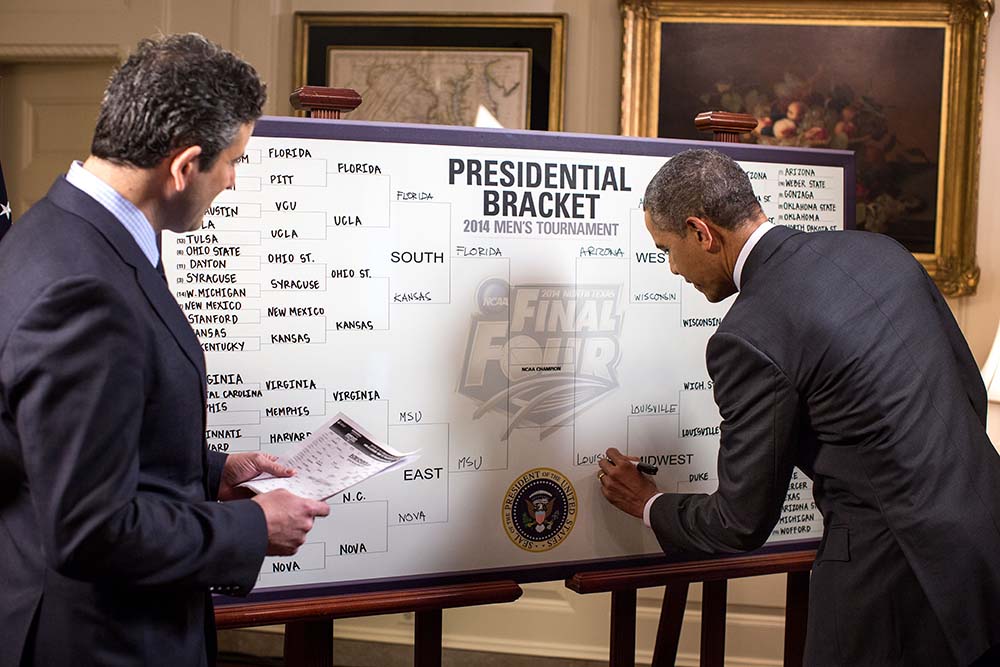March Madness, the pinnacle of collegiate basketball excitement, extends its reach beyond arenas and campuses to the highest echelons of power in the United States—the White House. Throughout history, presidents have showcased their love for college basketball, engaging in the frenzy of bracketology and embracing the tournament’s electrifying spirit. This article delves into the rich history of March Madness within the White House, highlighting presidents who reveled in the excitement and those who left a lasting mark on the intersection of politics and sports.
Early Presidential Connections to College Basketball: The roots of March Madness in the White House trace back to early presidents who held a passion for collegiate athletics. While formal bracket competitions may not have existed, presidents such as Theodore Roosevelt and Woodrow Wilson were known to appreciate sports like football and baseball, setting a precedent for future leaders’ involvement in athletic events. However, it wasn’t until the mid-20th century that college basketball’s prominence in the presidential sphere began to grow.
John F. Kennedy and the Emergence of Presidential Interest: The early 1960s saw a significant uptick in presidential engagement with college basketball, notably exemplified by John F. Kennedy. A fervent sports enthusiast, Kennedy openly expressed his admiration for the game, attending several college basketball games during his presidency. While there’s no record of Kennedy filling out brackets or publicly endorsing specific teams, his presence at games elevated the sport’s profile, paving the way for future presidents’ involvement in March Madness.
Richard Nixon’s Low-Key Affection: Richard Nixon, during his tenure as president, also demonstrated a subtle appreciation for college basketball. While he didn’t actively participate in bracket competitions or publicly endorse teams, Nixon occasionally attended games and recognized the tournament’s cultural significance. His interest in sports, albeit less pronounced than his predecessors, contributed to the ongoing integration of athletics into the presidential sphere.
Jimmy Carter’s Personal Connection: Jimmy Carter, an avid basketball player during his youth, brought a personal connection to March Madness during his presidency. While Carter didn’t publicly fill out brackets, his affinity for the sport was well-documented. He often spoke fondly of his own basketball experiences, emphasizing the values of teamwork and perseverance instilled by the game. Carter’s personal connection to basketball resonated with many Americans, further solidifying the sport’s place within the presidential narrative.
Ronald Reagan’s Endorsement: Ronald Reagan, known for his charisma and charm, embraced March Madness with enthusiasm during his presidency. Reagan recognized the tournament’s unifying power, often using it as a platform to connect with the American public. While he didn’t personally fill out brackets, Reagan frequently voiced his support for college basketball and encouraged citizens to embrace the excitement of the tournament. His endorsement contributed to the growing cultural significance of March Madness within the White House.
Bill Clinton’s Bracketology Legacy: Bill Clinton, a self-proclaimed basketball aficionado, elevated presidential bracketology to new heights during his time in office. Clinton enthusiastically filled out brackets each year, publicly revealing his picks and engaging in friendly competitions with celebrities and sports analysts. His active participation in March Madness captivated the nation, drawing attention to the tournament’s drama and unpredictability. Clinton’s bracketology legacy solidified his status as a passionate supporter of college basketball and left an indelible mark on the intersection of sports and politics.
George W. Bush’s Bracket Challenges: George W. Bush continued the tradition of presidential bracket challenges initiated by his predecessors. A former owner of the Texas Rangers baseball team, Bush brought his sports acumen to the White House and eagerly participated in March Madness festivities. While his brackets weren’t always successful, Bush’s enthusiasm for the tournament endeared him to many sports fans, showcasing a relatable and down-to-earth side of presidential leadership.
Barack Obama’s Bracketology Brilliance: Barack Obama, perhaps the most iconic figure in presidential March Madness history, transformed bracketology into a national phenomenon. A devoted basketball fan, Obama meticulously filled out brackets each year, sharing his picks with the public and engaging in spirited discussions about the tournament. His annual “Barack-etology” became a highly anticipated tradition, attracting attention from sports enthusiasts and casual fans alike. Obama’s passion for college basketball and his willingness to publicly embrace March Madness elevated the tournament’s cultural significance to unprecedented heights.
Donald Trump’s Departure from Tradition: Donald Trump, during his presidency, diverged from the established tradition of presidential bracketology. Unlike his predecessors, Trump opted not to publicly fill out brackets or actively engage in March Madness festivities. While he occasionally attended sporting events, including college basketball games, Trump’s approach to sports was less overtly enthusiastic compared to past presidents. His departure from the tradition of presidential involvement in March Madness marked a notable shift in the intersection of sports and politics within the White House.
March Madness in the White House embodies the enduring connection between sports and politics in American culture. From Lyndon B. Johnson’s informal bracketology to Barack Obama’s iconic “Barack-etology,” presidents have embraced the tournament’s excitement, contributing to its cultural significance and widespread appeal. While each administration brought its unique approach to March Madness, the tradition remains a beloved part of the presidential narrative, showcasing the human side of leadership and fostering unity among citizens through the shared love of college basketball. As future presidents take office, the legacy of March Madness in the White House will undoubtedly continue to evolve, perpetuating its status as a cherished American tradition.
